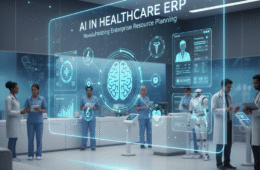
Introduction
In today’s fast-paced business world, companies are constantly seeking ways to streamline operations, improve efficiency, and enhance decision-making. One of the most critical processes in this journey is ERP Implementation, which integrates all major business functions into a unified system.
Whether a business is in manufacturing, healthcare, retail, or finance, the success of ERP largely depends on the expertise and guidance of the right ERP Company that can provide a robust digital roadmap.
Now, with the rise of Artificial Intelligence (AI), ERP is no longer just a management tool; it is becoming a smart, predictive, and automated ecosystem that transforms the way organizations operate.
1. Understanding ERP Implementation in the AI Era
ERP (Enterprise Resource Planning) is designed to connect different business operations like finance, HR, supply chain, production, and sales under a single platform. Traditionally, ERP Implementation was focused on integration, automation, and centralized control.
But with Artificial Intelligence, ERP systems are evolving from reactive tools into proactive systems capable of predicting business needs, automating decision-making, and offering real-time insights.
Some key improvements brought by AI in ERP include:
- Predictive analytics for business forecasting
- Automated decision-making through machine learning
- Intelligent chatbots for user support
- AI-driven personalization for customers and employees
- Smart anomaly detection to reduce errors and fraud
2. The Role of Artificial Intelligence in ERP Implementation
a) Predictive Analytics and Forecasting
AI enables ERP systems to analyze large volumes of historical and real-time data. This helps businesses forecast demand, identify trends, and adjust strategies proactively. For example:
- Retailers can predict seasonal product demand
- Manufacturers can plan production based on future sales forecasts
- Finance teams can predict cash flow more accurately
b) Natural Language Processing (NLP) in ERP
With AI-powered NLP, employees can interact with ERP systems using simple language commands instead of complex queries. For example, a manager could type, “Show me sales data for Q2” and receive immediate insights.
c) Intelligent Automation
AI enhances process automation in ERP by learning from workflows and making suggestions to improve efficiency. For instance, AI can automatically generate purchase orders when inventory reaches a predefined threshold.
d) Improved Data Accuracy and Decision Support
ERP systems often struggle with duplicate or incorrect data. AI algorithms detect anomalies, clean data, and recommend corrective actions—ensuring that decision-makers rely on accurate information.
3. How AI is Reshaping Key Areas of ERP Implementation
3.1 Finance & Accounting
- AI-driven ERP can automate invoice processing, expense tracking, and fraud detection.
- Predictive financial analytics help CFOs make better investment decisions.
- Real-time monitoring of transactions reduces compliance risks.
3.2 Human Resources
- AI chatbots answer HR queries 24/7.
- Machine learning algorithms match candidates with job profiles.
- Employee performance predictions help with succession planning.
3.3 Supply Chain Management
- AI enhances demand planning and reduces stockouts.
- Predictive shipping models optimize delivery routes.
- AI detects potential supplier risks and disruptions before they occur.
3.4 Manufacturing & Production
- AI monitors machine health and predicts maintenance needs.
- Automated scheduling reduces downtime.
- Real-time production analytics improve quality control.
3.5 Customer Relationship Management (CRM)
- AI analyzes customer interactions for personalization.
- Automated chatbots enhance customer support.
- Predictive models identify churn risk and recommend retention strategies.
4. Benefits of AI-Enabled ERP Implementation
- Smarter Decision Making – Business leaders get actionable insights.
- Increased Productivity – Repetitive tasks are automated.
- Cost Savings – AI reduces errors, inefficiencies, and delays.
- Enhanced Customer Experience – Personalization improves satisfaction.
- Agility and Flexibility – Businesses adapt faster to market changes.
- Stronger Compliance – AI helps maintain accurate records and audit trails.
5. AI-Driven ERP Trends in 2025 and Beyond
- AI-powered chatbots becoming standard in ERP systems
- Voice-activated ERP through smart assistants
- AI in cloud ERP for scalability and accessibility
- AI-driven cybersecurity to protect ERP data
- Integration of AI with IoT for real-time monitoring in industries like manufacturing and logistics
6. Challenges in Integrating AI with ERP
While AI brings many benefits, businesses must be prepared for challenges such as:
- High Implementation Costs – AI solutions require investment in technology and talent.
- Data Privacy Issues – Sensitive business data must be protected.
- Skill Gaps – Employees may need training to use AI-enabled ERP.
- Change Management – Shifting from traditional ERP to AI-based systems requires cultural change.
7. Choosing the Right ERP Company for AI-Driven Implementation
Selecting the right partner is crucial. A good ERP Company will:
- Understand your industry’s unique requirements
- Offer customization for AI features
- Provide training and support for employees
- Ensure data security and compliance
- Deliver scalable solutions for future growth
8. Real-Life Use Cases of AI in ERP
- Retail: AI predicts seasonal sales spikes and automates promotions.
- Healthcare: AI in ERP helps in managing patient data and compliance.
- Manufacturing: AI monitors machines to prevent breakdowns.
- Finance: AI predicts fraud and automates audits.
- Logistics: AI optimizes routes for cost and time savings.
9. The Future of ERP Implementation with AI
Artificial Intelligence is making ERP systems self-learning, predictive, and adaptive. In the coming years, AI will move ERP from being a back-office support tool to becoming a central intelligence hub for organizations. Businesses that adopt AI-powered ERP early will gain a significant competitive edge.
Conclusion
Artificial Intelligence is not just improving ERP—it is transforming ERP Implementation into a smarter, faster, and more reliable process. From finance to supply chain, HR to manufacturing, AI is enabling organizations to make better decisions, reduce costs, and improve customer experiences.
To succeed in this transformation, businesses must partner with the right ERP Company that has the expertise to integrate AI seamlessly into their ERP strategy.





